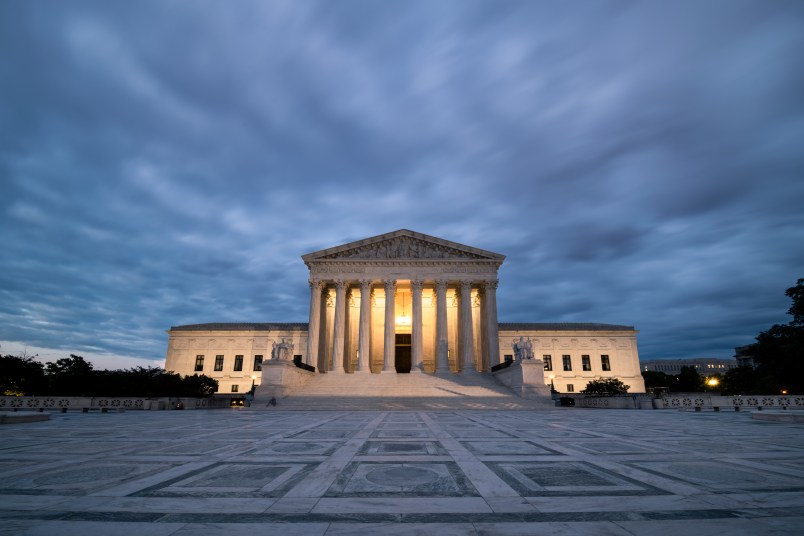The Indiana official in charge of mediating public access disputes came down against the municipally-owned hospital corporation for deciding to petition the Supreme Court behind closed doors.
Experts warn that the case, which activists have been lobbying Health and Hospital Corporation (HHC) to drop, could give the right-wing majority the opportunity to hobble major spending programs like Medicaid.
Activists had flipped through years’ worth of records from HHC meetings, finding no mention of the case, much less a board vote to appeal it to the Supreme Court. So they filed a complaint with Public Access Coordinator Luke Britt. On Friday, he issued his opinion.
“The reasonable conclusion is the HHC Board took final action outside of a public meeting, or it abdicated its duty to mind and oversee the prodigious act of filing a petition for certiorari with SCOTUS,” Britt wrote in a ruling obtained by TPM.
HHC’s lawyer had argued that the board delegated its legal decisions to executive staff, justifying the lack of a public record.
“The executive staff of the corporation, through their internal and external counsel, have defended the interests of the corporation throughout Talevski’s pendency, taking countless actions in aid of the defense with guidance from counsel, including directing the filing of a myriad of state records, such as the petition,” attorney Tenley Drescher-Rhoades wrote of the case in a recent letter obtained by TPM.
“It would not be practical, feasible, or in the corporation’s or the public’s best interest for the corporation’s governing body to attempt or have to make litigation decisions in each of these matters, as to which they have no day-to-day oversight, involvement, or knowledge, which is why they long ago delegated this authority to the corporation’s executive staff,” she added.
Britt was unimpressed.
“While some executive, operational, and administrative duties will necessarily have to be delegated to staff, the volitional decision and act of pursuing further litigation with our country’s highest court is something else altogether,” he wrote.
“If an act as momentous as petitioning SCOTUS to reverse the Seventh Circuit is treated as a rote, secretarial task, then a board simply becomes a performative, rubber stamp for executive staff,” he added. “That is neither the spirit of the Open Door Law nor—in the opinion of this office—the intent of the legislature.”
He also seemed to allude to activists’ current and ongoing campaign to get the HHC board to withdraw the case before it gets to oral argument.
“It does not stand to reason that executive staff or general counsel of an organization, or both, would have carte blanche, blank check authority to act on the Board’s behalf for a matter such as this,” he writes. “One wonders what the fallout would be if the Board had an adverse reaction to litigation strategy it did not approve.”
Activists have expressed incredulity that the board would be so resistant to their calls to drop the case due to the damage it could pose to the recipients of federal spending programs, including the most vulnerable Americans.
“I have a feeling that if the board really understood what this case is about, they’d be mortified,” Bryce Gustafson, an organizer with Indiana’s Citizens Action Coalition, told TPM. “There’s a doctor on the board, a disability rights lawyer on the board.”
It’s uncertain whether this ruling will have any practicable effects. Britt ends his ruling by saying: “It is unclear what judicial remedy—if any—is available to the complainant for an ODL violation in this context.”
But as organizers continue their effort to pressure, goad, encourage and shame the HHC board into dropping the case, they’ll count an official decision finding that the board erred in its quiet decision to take the fight to the high Court as a victory.
Read the decision here:







I guess the theory is that you can’t be held to public account if you just delegate all work to the non-public functionaries.
Indiana wants me, lord i can’t go back there…
The barbarians at the gate.
Incredible, I had no idea there was such internal controversy within the organization over the decision to appeal to the Supreme Court.
And that despite the controversy raging across the country over the potential implications of an adverse decision, all was calm among the hospital’s executive staff.